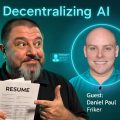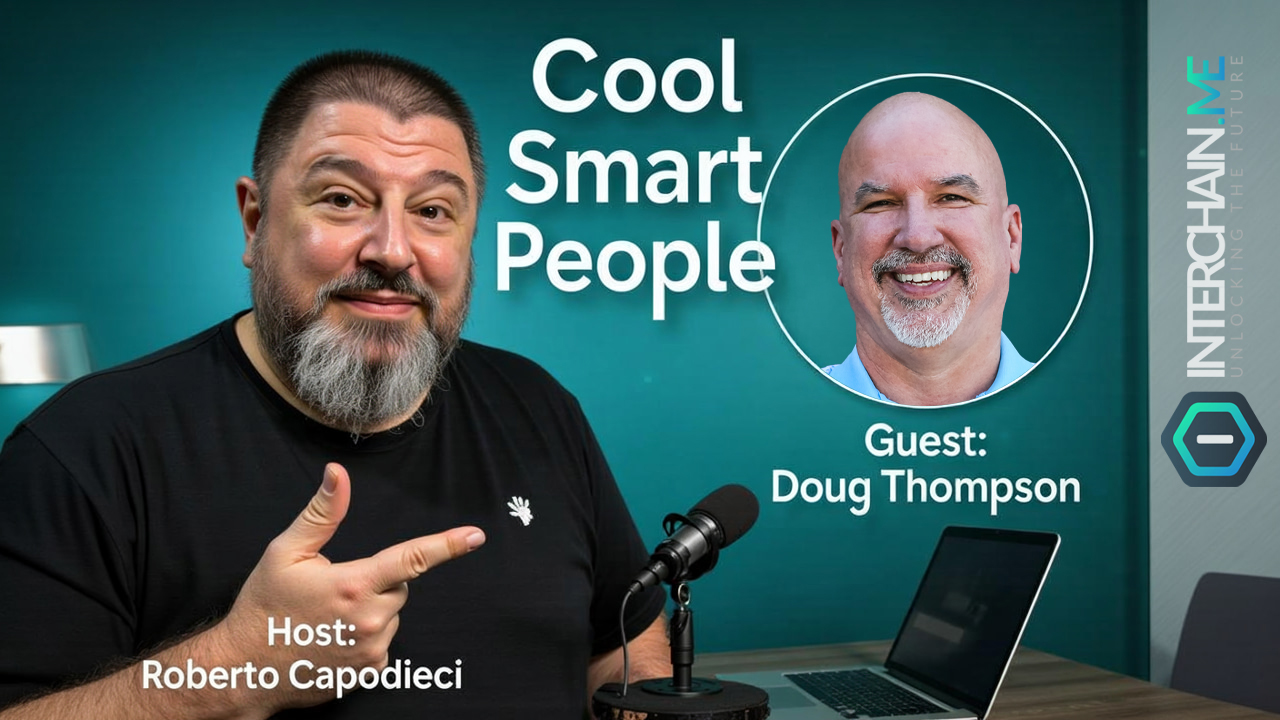Listeners:
Top listeners:
-
 play_arrow
play_arrow
Decentralizing AI - Navigating the Future of Work with AI
-
 play_arrow
play_arrow
Life Tips - From Video Games to Virtual Reality: Henry Woodman's Journey
-
 play_arrow
play_arrow
Cool Smart People - The Art of Storytelling in Tech
-
 play_arrow
play_arrow
Old Tech - Integrating Old and New: The Future of Technology
-
 play_arrow
play_arrow
Cool Smart People - Revolutionizing Diabetes Care with Technology
-
 play_arrow
play_arrow
Life Tips - From Trauma to Triumph: Alan Lazaros' Journey

- arrow_back Home
- keyboard_arrow_right Uncategorized
Selling the Invisible: Doug Thompson on Storytelling, AI Reality Checks, and Making Tech Land with Humans
Uncategorized Roberto Capodieci 05 September 2025
Guest: Doug Thompson — Sales Engineer (ex-Microsoft), AI ambassador, host of The Doug Thompson podcast
Show: Interchain.me
Listen to the Podcast
Doug Thompson’s superpower isn’t code—it’s translation. After decades in pre-sales at Microsoft and now Tanium, Doug helps non-technical buyers grasp why complex tech matters. His lens: tell true stories in the customer’s language, set ethical guardrails, and adopt AI with a crawl-walk-run plan.
Why storytelling beats “speeds & feeds”
-
People buy outcomes, not effort. Your six-month build vs. one-afternoon hack is irrelevant; saving money, time, or risk isn’t.
-
Audience first. IT admins might love architecture diagrams; CMOs won’t. Translate value into their vocabulary.
-
Make it relatable. Doug learned this early—explain repairs in plain terms and customers stop bristling at the invoice.
“Founders are passionate about what they built. Buyers care about why it matters—in their words.”
AI: the pitch, the promise, and the guardrails
-
Two camps: the Terminator worriers and the “AI can do everything” optimists. The best adopters live between—curious, cautious, measurable.
-
Assistant, not overlord. Use AI to curate research, draft, triage, and summarize. Always validate (hallucinations are real).
-
Crawl → Walk → Run. Start with low-risk automation; layer human approvals; then expand scope. Keep probes and audits in place.
Practical wins that land with buyers
-
Cybersecurity triage: sift noise, highlight true risk, let humans focus on incidents that matter.
-
Patch automation: orchestrate the tedious steps; alert when something fails; free teams for higher-value work.
-
Ops copilot: news curation, quick briefs, and “explain like I’m five” primers for industry contexts.
Risks & ethics (say them out loud)
-
Job disruption: low-skill, repetitive roles will shift. Upskill operators to control the robots they once tended.
-
Bad actors move fast: malware-as-a-service, deepfakes, synthetic identities—assume adversaries are using AI today.
-
Don’t over-promise. AI still mishears accents, fabricates sources, and fails at nuance. Set expectations; ship value; iterate.
Robotics + AI: hype vs. here-and-now
Humanoids grab headlines, but the near-term impact is unglamorous and real: co-bots, autonomous tractors, pick-and-place arms that learn faster. If you understand the assembly process and can drive the robot, your value grows.
Regulation, culture, and generational adoption
-
Policy lags reality. Lawmakers need “ELI5” explanations to legislate wisely; technologists must help without condescension.
-
Leapfroggers win. Regions without legacy systems can adopt faster (fewer constraints), though power and data-center capacity still bottleneck.
-
Elder care use case: simple voice AIs reduce repetitive burden (“What time is lunch?”), freeing staff for human care.
Education is changing (and should)
Shift from memorization to how to think and how to use AI responsibly. Teachers become curators; students build proof-of-work portfolios (GitHub, writing, small projects). Credentials matter; visible outcomes matter more.
Build a brand people remember
-
Publish short, useful pieces.
-
Tell stories in your voice (frameworks are reusable; authenticity isn’t).
-
Engage where your buyers are (Doug: “the Doug Thompson” on LinkedIn).
-
Think “proof of work”: show, don’t tell.
Doug’s playbooks
Storytelling for technical sellers
-
Start with the problem. If the buyer can’t nod to the pain, you’re not ready to pitch.
-
Translate outcome metrics. Time saved, risk reduced, revenue unlocked—attach numbers when possible.
-
Use micro-stories. A relatable anecdote beats a feature list.
-
Close with next steps. Pilot scope, success criteria, and timeline.
Responsible AI adoption
-
Crawl: assistive use (research, summaries), low-risk automations with human review.
-
Walk: workflow orchestration, policy-backed approvals, alerting, and audit.
-
Run: agentic actions on well-defined rails; continuous measurement and red-teaming.
Pull quotes
“Don’t replace people—replace drudgery.”
“AI should make you more you, not less human.”
“Set the expectation right: we’ll crawl first, then walk, then run.”
“Outcomes beat effort. Every time.”
My take
Doug reminds us that the hardest part of selling advanced tech isn’t the model or the stack—it’s meaning. If you can surface the right story, set the right guardrails, and show real before/after outcomes, AI becomes inevitable and helpful—without the hype hangover.
Credits
Recorded for Interchain.me. Host: Roberto Capodieci. Guest: Doug Thompson.
Connect
-
Doug Thompson: “the Doug Thompson” on LinkedIn; host of The Doug Thompson podcast; writing a book on storytelling for technical professionals.
Search
Sign up to Interchain Me Newsletter
Blog News
Apply to be a guest
🎤 Want to be a guest on one of our podcasts? Whether you’re an expert in blockchain, a tech enthusiast, or an AI aficionado, we’re looking for guests across all our series, including “Life Tips,” “New Tech,” “Old Tech,” and “Past Predictions.” Share your insights, experiences, and expertise with our audience! Apply now for a chance to join us as a guest. 🎙️✨

🎧 Got a topic in mind for our next podcast? Help shape the conversation by suggesting an episode idea! Choose from categories like “Cool Smart People,” “Decentralizing AI,” “Learn with Rob,” “Life Tips,” “New Tech,” “Old Tech,” “Past Predictions,” “Rob’s Memory Lane,” and “Throwback Thursday.” We’re eager to hear your ideas and create content that resonates with you. Share your suggestion today!
(C) 1974-2024 Roberto Capodieci

Be the first to leave a comment